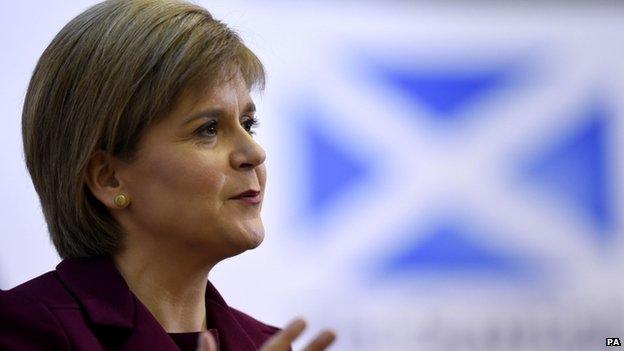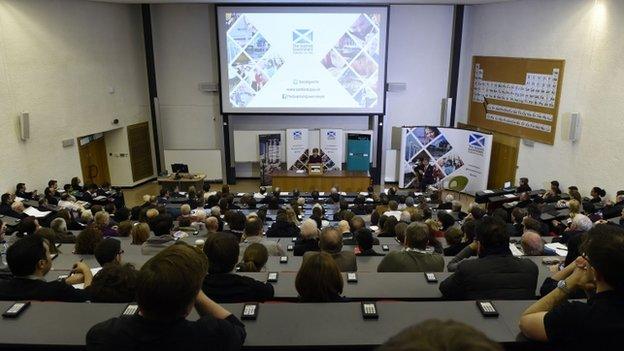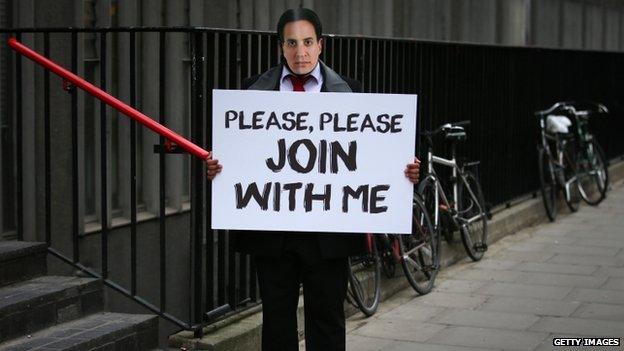Sturgeon: 'The deficit is hugely important'
- Published

Ms Sturgeon has several speaking engagements in London ahead of the general election
Nicola Sturgeon seems to be doing much of her election campaigning in London.
She's a new leader, with a message about progressive priorities, and she has an attentive audience.
One such gathering was at University College on Wednesday. It's to be followed, we were told, by several more lectures in London during the campaign.
That's because polls point to the SNP potentially playing a key part in the arithmetic of getting to a Westminster majority after the May ballot.
The first minister argues it's also because she's talking the politics of progressive priorities - tackling inequality, putting people first, with a softer approach to cuts and welfare reform - that many on the left in England would like to hear from the Labour leadership.
Even if they can't vote for her, it doesn't harm her cause in Scotland to have English Labour supporters warming to her message.
To that progressive argument, she has newly added some numbers - not figures to which she is wedded, she conceded, but to illustrate a point.

Ms Sturgeon was addressing an audience of academics at University College London
And the point is this. If the Westminster budget is increased by, say, £180bn spread over four years, not only would the pain of austerity be lessened, but the deficit could still be brought down.
This would be a half of one per cent on departmental spending. It would be "modest" and "reasonable".
Sounds too good to be true? Well, that cut in the deficit would be as a share of national output, rather than the total number.
If you increase spending, unless tax returns take an unexpected hike, then your deficit will rise. And so long as you run a deficit, your debt keeps going up. Servicing a growing debt takes more and more out of your budget.
You also want to avoid showing a lack of commitment to fiscal discipline costing you more in the money markets. As Greeks are now being reminded, bond traders charge a high price for uncertainty and deficit defiance.
Prudent
"The deficit is hugely important," the first minister told her academic audience. But it's a symptom rather than the cause of difficulties, she went on.
And cutting it, in isolation from the impact of doing so, is no way to run a government.
Instead, increasing it would allow Westminster to follow those progressive priorities.
SNP deputy leader Stewart Hosie MP was quizzed on BBC's Daily Politics programme how this would work. This was more vigorous questioning than the academic audience across town. He wouldn't say if taxes or borrowing would take the strain of higher spending.
Instead, he said there would be "a longer trajectory to fiscal consolidation". The words "medium-term", "balanced" and "prudent" are then used for reassurance.

A Conservative supporter in an Ed Miliband mask had a message for Ms Sturgeon
So the SNP message to Scottish voters is that Labour has signed up to the same austerity measures deemed necessary by incumbent Conservatives, and instead, the SNP offers higher spending.
In London, it's a modest, balanced, prudent, reasonable approach. Neither Nicola Sturgeon nor her deputy are saying austerity can be avoided. Instead, it's being re-badged and re-profiled, or spread out longer.
If higher spend for a lower deficit doesn't add up, then it's pointed out that the policy that did make sense to George Osborne back in 2010 has fallen a long way short of its deficit-killing target.
And, goes the argument, even if UK government debt is brought under control, the growth that is now found in the economy owes much to individuals, or households, building up yet more debt, when it was already very high and needed to come down.
Defiance
Politically, this is a long way from the red meat of the independence referendum campaign. As the first minister observes, Scotland was told by pro-union campaigners last year that it was equal and valued within the UK, so she is now offering to play a constructive role within it.
A coalition with Labour is not being ruled out. But talk of a deal with Labour - not for coalition but to support it on vital Commons votes that could keep Ed Miliband in power - is being strongly encouraged. Indeed, it appears to be the main plank of the SNP's campaign.
It may be a tricky message to get across to Scottish voters: 'vote SNP to kick out your Labour MP, because Scottish Labour has failed and is out of touch - and then watch the SNP put Ed Miliband into Downing Street'.
The defiant refusal to accept more austerity, which won power for Syriza in Greece last month, is not being offered here. Instead, a serious bid for a share of power in Britain requires a message that won't spook the markets.
Nor is the pitch for a bigger share of Westminster spending coming to Scotland. Not yet, anyway.
The basis for such a deal with the SNP is being gradually set out: no renewal of nuclear weapons, no deal with Tories (a requirement of SNP conference policy), at least the devolution of powers in the Smith Commission, and an end, or at least a softening, of spending cuts to meet progressive priorities.
Hard cop
From the audience in London came the observation that the first minister's message was "soft Nicola versus hard cop Alex", with reference to her predecessor's intention of being returned to Westminster.
"A good combination, don't you think?" she replied. Part joke, part strategy.